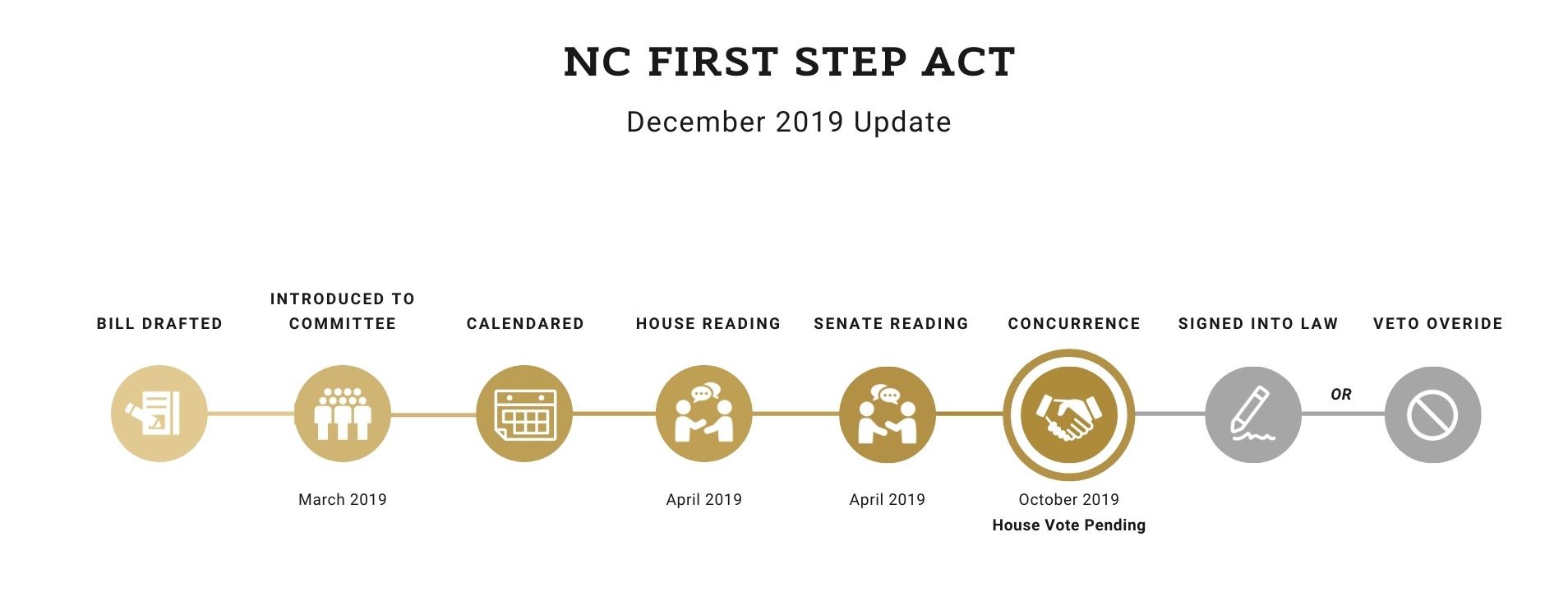NC First Step Act July 2020 Update
On June 26, 2020, Governor Cooper signed the NC First Step Act into law! Learn what the requirements are to qualify in our latest post.
NC First Step Act December 2019 Update
The NC First Step Act has the potential to positively affect a great number of North Carolina inmates with criminal felony offenses. While this bill is not yet law, it’s made notable progress in NC legislature since its introduction in March of 2019.
As of December 2019, the NC First Step Act has passed in both the House and Senate. However, it still needs concurrence from the House before it can be ratified and signed into law. While the North Carolina First Step Act is not yet law, it should be addressed during the 2020 legislative session.

What is the Federal First Step Act?
In 2018, Congress passed the Federal First Step Act with bi-partisan support. On December 21, 2018, President Donald Trump signed it into law. The act, made famous in pop culture by celebrities such as Kim Kardashian, enjoyed overwhelming support.
The law sought to grant relief to criminal defendants in certain situations. The type of relief is varied and extensive. But, it would include the following:
- compassionate release
- housing convicts in facilities closer to their families
- reducing certain sentences
A “Second-Step” Act is being planned.
Prison Reform for North Carolina
The North Carolina First-Step Act is not as expansive as its Federal counterpart. To learn what was actually signed into law when the NC First Step Act was passed, read our latest update here.
In North Carolina, like in Federal law, mandatory minimums are imposed for possession of certain amounts of controlled substances. Many argue that those sentences are both racially disparaging and overly punitive to addicts that are not drug dealers.
The North Carolina First-Step Act aims to give criminal defendants a “safety-valve” if they are serving a mandatory minimum sentence.
Who Would Qualify Under the NC First Step Act?
The safety-valve mechanism would allow defendants serving a mandatory minimum sentence to file for an altered sentence. Judges would have the authority to reduce sentences, reduce fines, or place a person on probation and suspend the rest of the sentence.
The relief is available to those who are serving a sentence that would
- Result in an injustice to the defendant, and
- Where the mandatory sentence is not necessary to protect the public.
The law would NOT aid those people whom the Judge determines to occupy a position of organizer, a supervisory position, or any other position of management in a continuing criminal enterprise (CCE). Crimes for CCE are rarely prosecuted. But, it appears that this legislation would give Judges the ability to consider evidence of CCE without a conviction of that crime.
Another important component is that the law would be retroactive. This means it would give those serving mandatory minimum sentences up to three years to file a motion to alter their sentence.
Procedure for this relief would come in the form of a Motion for Appropriate Relief, governed by NCGS 15A-1411 – 1422. This type of motion is made to correct any errors that happened before, during, or after one’s criminal trial or proceeding. This would include errors related to the entry of a guilty plea.
The State would have 60 days to respond to any motion filed. Then, a Superior Court Judge would conduct a hearing unless the Defendant and the District Attorney can agree upon a specific outcome to the motion.
Contact a Criminal Defense Attorney Today
At Dummit Fradin our criminal defense attorneys fight fiercely for your rights. So, when new laws like this pass, know that we have your back. Contact us today to schedule a personal consultation.